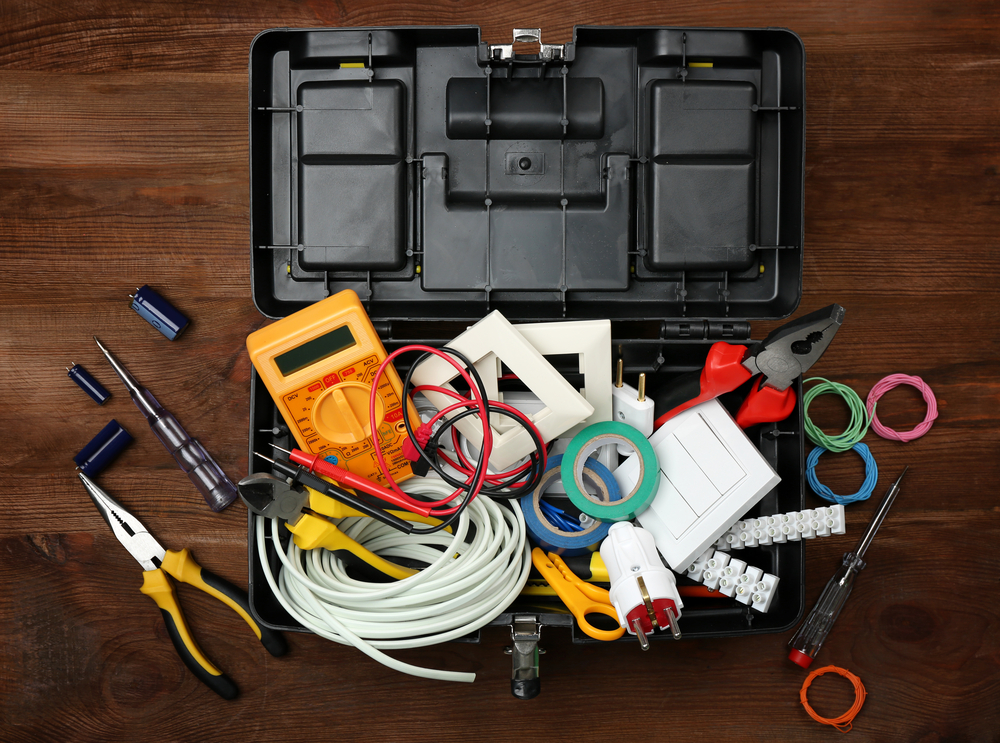We may earn revenue from the products available on this page and participate in affiliate programs. Learn More ›
Whenever you are working with electrical systems or working on electrical equipment, it’s important to be aware that there is a constant risk associated with electricity. Not only can you electrocute yourself, but the heat generated by electricity can also result in burns if you aren’t careful where you touch. Due to the risks of working on an electrical system—as well as the need for specialty tools that can handle the complexity of electrical devices—there is a wide variety of tools designed specifically for electricians.
The best electrician tools typically include safety features, like insulated handles, to help protect the user while they’re working. However, you can also find tools like digital multimeters that help identify a live current before you ever pick up the screwdriver or pliers. Below, find out more about the various types of tools and what to consider in order to select the best electrician tools for your next project.
Types of Electrician Tools
There are a significant number of different electrician tools, which are grouped into three categories: hand tools, power tools, and specialty tools.
Hand Tools
The best electrician hand tools include common tools many DIYers already have for miscellaneous jobs around the home. Expect to find hammers, utility knives, nut drivers, wrenches, sockets, and a wide assortment of screwdrivers in an electrician’s tool box. One difference in electrician hand tools, however, is that they often come with an insulated handle to guard against a live electrical current.
These tools are typically more affordable than power tools or specialty tools, simply because they are easier to make and are commonly available for purchase online or in local home improvement stores.
Power Tools
Saws, drills, and impact drivers are frequently seen hanging from an electrician’s tool bag and are regularly used during electrical work. Saws are effective for cutting notches to run wire or for trimming pieces of conduit for installation. Drills can also be helpful for wire runs or to create a path for long conduit runs, though both drills and impact drivers tend to get the most work tightening or loosening screws and other fasteners.
The best electrician power tools can also include large rotary hammer drills as some electrical work requires drilling or cutting through masonry materials, like concrete, brick, and mortar. Just keep in mind that these tools typically cost more than either hand tools or specialty tools.
Specialty Tools
Electrical systems are not usually put together with just a few nails and they’re often concealed behind walls, above ceilings, or under floors, so it’s important to have the right tools on hand for the job. This includes a variety of specialty tools, like wire strippers for removing the insulating sleeve from the end of a wire or crimpers to close a splicing connector for quick connections between two wires.
Electricians often use digital multimeters—which are capable of reading continuity, capacitance, and frequency—to test the voltage, though they may also use a voltage tester for this purpose. If you are running wire, look for fish tape to help pull the wire through tight spaces (like behind walls), and use electrical tape or conduit binders to secure the wire.
What to Consider When Choosing the Best Electrician Tools
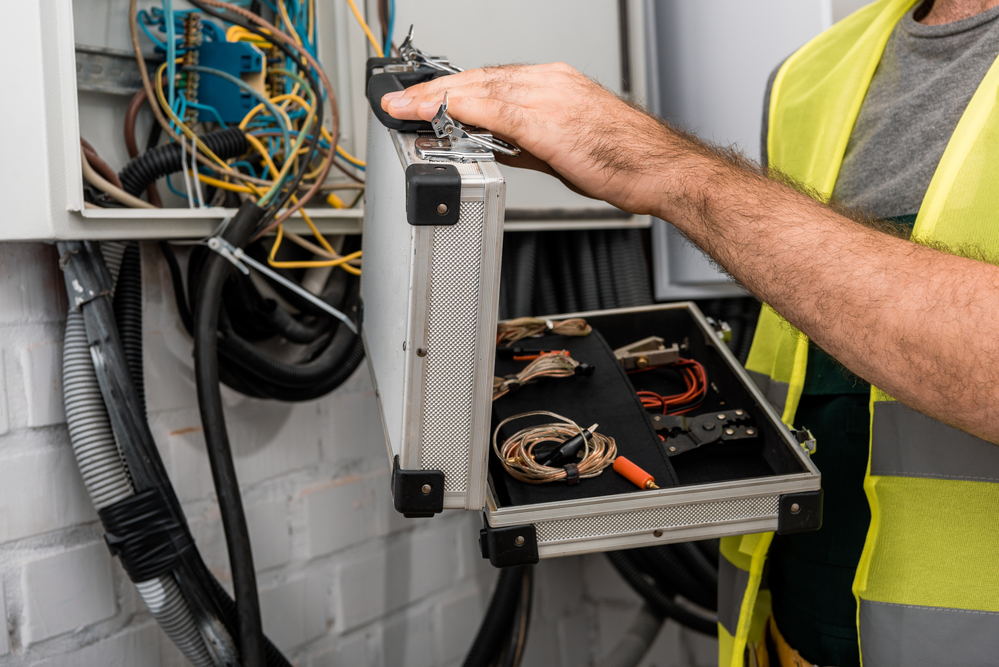
Picking up the first electrician tool set you see isn’t a good way to invest in quality tools. Instead, take some time to learn about several key factors that can help you select the best electrician tools for your workshop.
Purpose
The reason behind the wide variety of electrician tools available is that each tool is designed for a different purpose. It can be tempting to grab the most interesting options, but if you are looking for electrician tools to complete a specific task, it’s very important to understand the function of each tool.
For instance, the metal head on a set of pliers can be used to hit a nail, but it isn’t nearly as effective as a hammer, so just because a tool works doesn’t mean it’s the best option or that it’s even designed for that use. Rely on wire cutters to cut wire, wire strippers to strip wire, crimpers for crimping splicing connectors, and screwdrivers for fastening screws.
Weight and Comfort
Many electrical systems run through the ceiling of a basement or in the walls, so you may have to work with your hands up over your head in a tight spot. This means you should consider the weight and comfort of your tools. Large, bulky tools will be difficult to carry around a job site or hold for long periods of time and if you need to reach behind a wall or work overhead, these tools can greatly reduce the efficiency of your projects.
Small, lightweight tools increase control and maneuverability while reducing user fatigue. Similarly, comfortable handles and padded grips can help lessen muscle strain and improve control while you work. These padded handles also offer a layer of insulation to help protect your hands from electricity. Just remember that lightweight tools also tend to be less durable, so you may need to replace them more frequently than heavy-duty tools.
Safety and Insulating Rating
Safety needs to be a priority when you are working with electrical systems because it’s easy to accidentally electrocute, burn, cut, or even stab yourself while you work. It’s often forgotten, but electrical wires are made of sharp metal that can pierce skin with very little force, so it’s best to wear protective gloves to keep your hands safe. Safety glasses are another essential piece of personal protective equipment for working with electrical systems.
Appropriate caution isn’t limited to PPE. You should also look for electrician tools that have insulated handles to protect yourself from live currents. Standard plastic or rubber handles provide basic insulation, but it’s better to rely on tools that have a specific insulating rating. This rating is typically listed by the manufacturer and can range from 1,000 volts to over 2,000 volts.
Storage
Purchasing individual tools means that you will need to either find new storage options or rely on your existing tool box to store and organize these items. A tool box can be a great way to organize a new set of tools, but if you are planning on moving around a lot while you work or if you will be climbing up and down ladders, it may be better to invest in a tool belt.
Some electrician tools will come with a specialized carrying case to help keep your tools safe and organized when they aren’t being used.
First-Year Apprentice
A good way to determine what you should have on hand for basic electrical repairs at home is to consider the tools a first-year apprentice electrician would need. Take a look at the list provided to get a better idea of the common tools required for standard electrical system projects.
- Hand tools will make up the bulk of the tool box. A first-year apprentice will need Channellock pliers, lineman’s pliers, diagonal pliers, needle-nose pliers, insulated screwdrivers, a hacksaw, a utility knife, a torpedo level, a hammer, and a tape measure.
- Power tools are expensive and take up a lot of space in a tool box, but the basics are relatively limited and include a drill, an impact driver, and a reciprocating saw.
- Specialty tools that are required for many electrical jobs include wire strippers, crimpers, wire cutters, fish tape, a multimeter, and electrical tape.
This list is not exhaustive and, depending on the employer, there could be additional tools that are expected of a first-year apprentice. However, it’s a good starting point for tackling a wide variety of electrical projects.
Our Top Picks
This electrician tools list is a great place to start the search for top-quality tools designed for working on electrical systems. We selected the following based on several key factors, including the tool type, purpose, weight, and comfort.
1. Wire Cutter and Wire Stripper
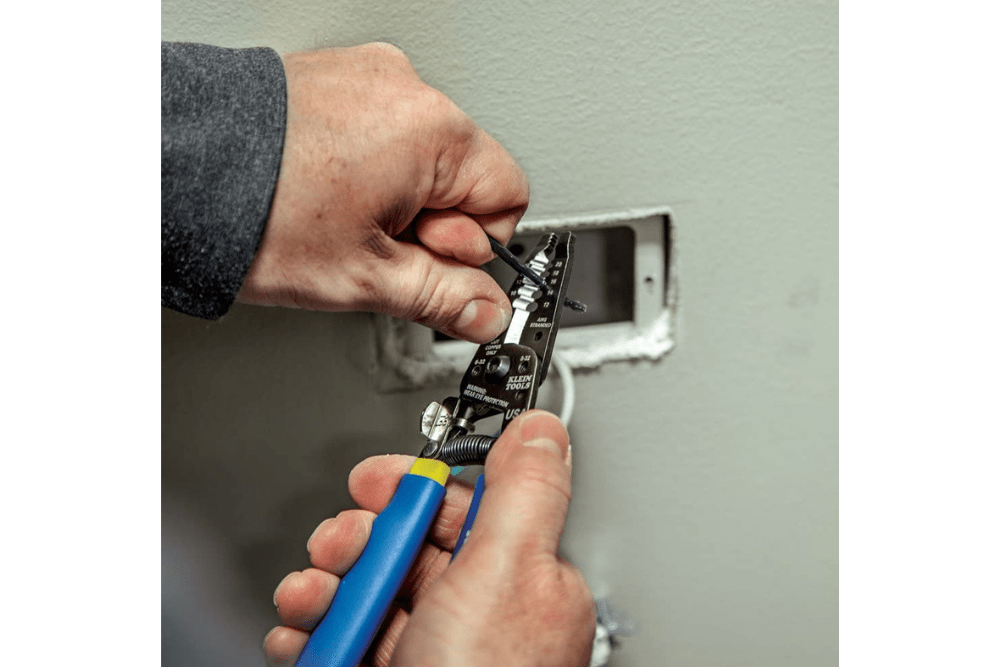
This impressive electrician tool is a specialty product that combines the cutting ability of a small wire cutter with the wire-stripping capacity to strip several different gauges of wire. The tip of the tool has a serrated nose to bend, shape, and pull pieces of wire, while the curved handle helps improve the grip and maneuverability of the tool.
Get the Klein Tools Wire Cutter and Wire Stripper on Amazon for $19.99
2. Insulated Electrician Screwdrivers Set
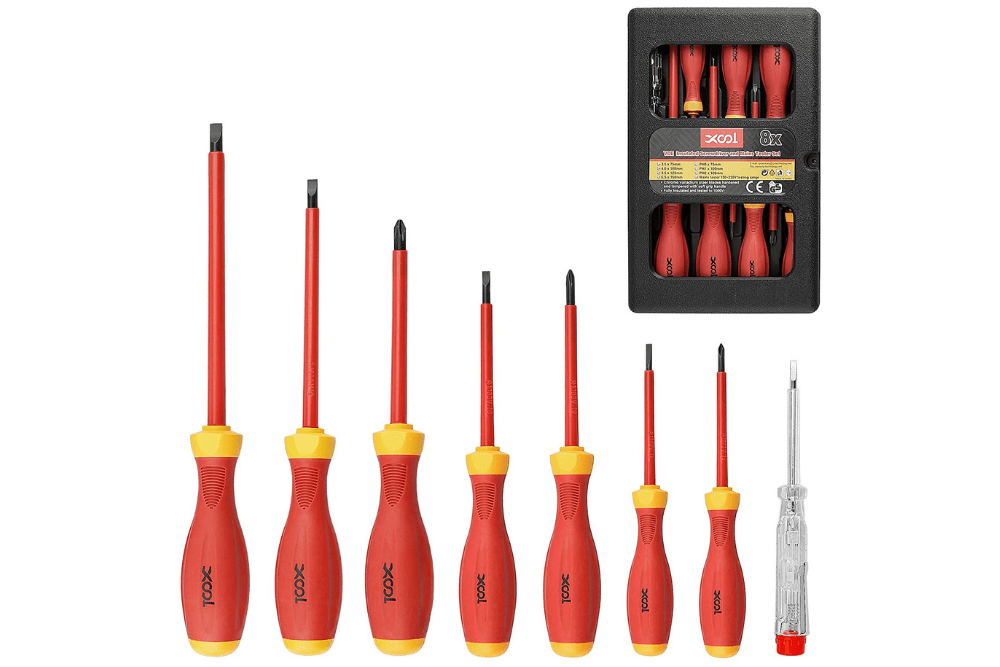
Take advantage of the high-quality nonslip handles of these insulated electrician screwdrivers for better control in tight spaces. The screwdrivers are made with chrome vanadium steel, and they feature magnetic tips that help prevent small screws from getting misplaced. Electricians and experienced DIYers can tackle electrical projects with this screwdriver set and feel confident knowing the insulated handles protect the user from up to 1,000 volts.
Get the XOOL Insulated Electrician Screwdrivers Set on Amazon for $26.79
3. Rotary Hammer Drill
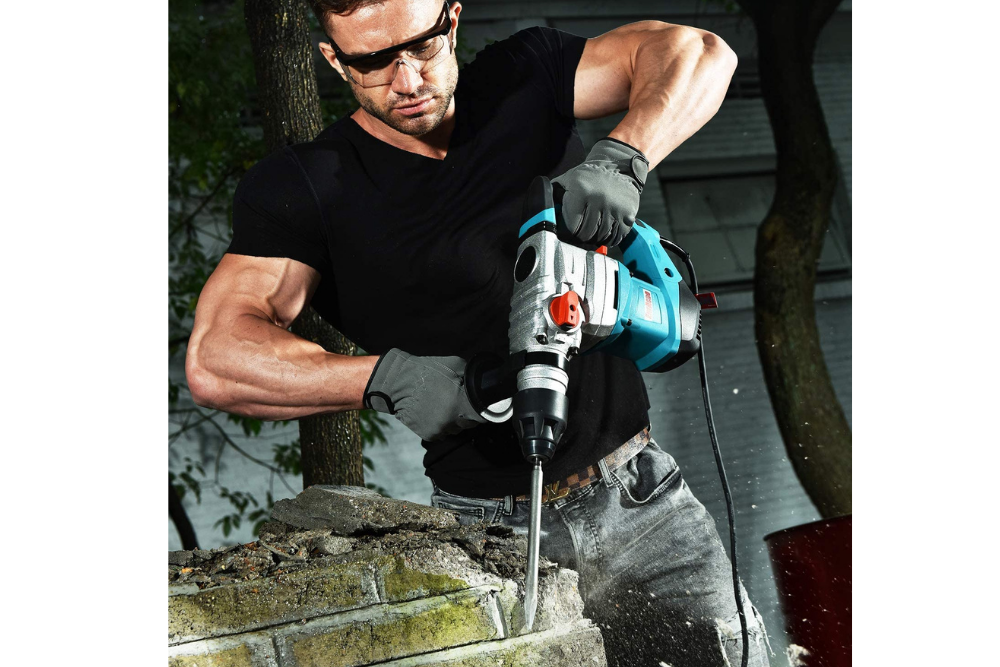
Break through mortar, brick, and concrete to run wire or conduit with this heavy-duty rotary hammer drill by ENEACRO. The drill comes with three large drill bits and two durable chisels for breaking up concrete slabs, and it also has a protective carrying case that can hold the drill and all included accessories. Built-in vibration control helps absorb vibration energy before it can reach the handle to protect the user’s hands while they work.
Get the ENEACRO Rotary Hammer Drill on Amazon for $127.95
4. Lineman’s Pliers
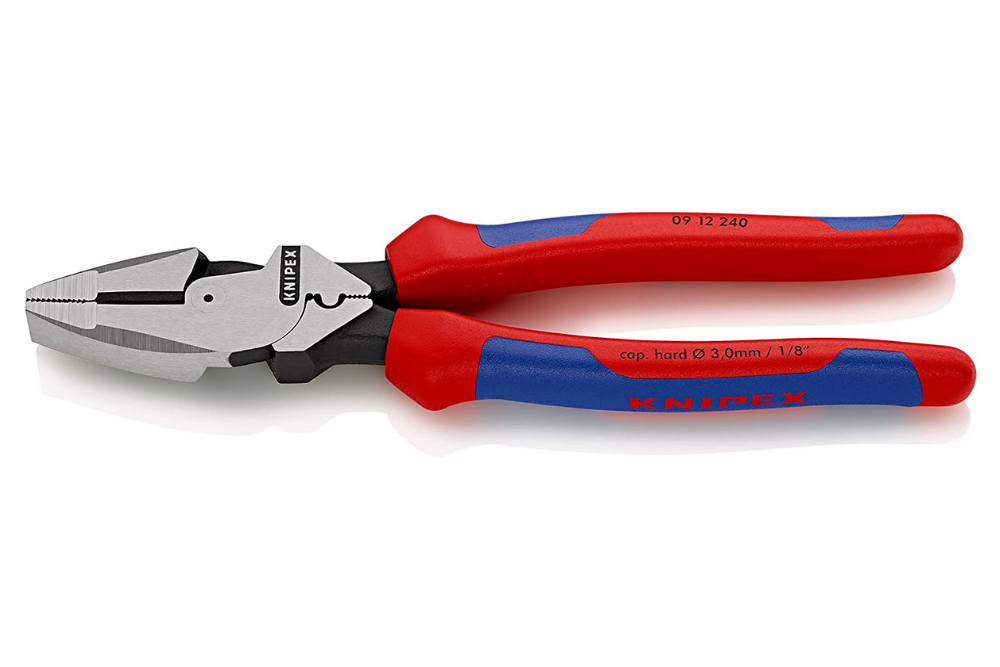
Cut, twist, and grip wires with these heavy-duty lineman’s pliers that weigh just 1 pound, improving user control and maneuverability while reducing fatigue. The pliers have a cutting edge for slicing through wires and a textured tip to help grip wires firmly in the jaws of the tool. Behind the pivot point, these Knipex pliers have an additional gripping zone for pulling nails and feature a built-in fish-tape puller to help run wire efficiently.
Get the Knipex Lineman’s Pliers on Amazon for $55.96
5. Magnetic Torpedo Level

The compact size and lightweight design of this torpedo level make it easy to carry around in a tool belt or tool box. It features multiple high-visibility bubbles to measure 90 degrees, 45 degrees, 30 degrees, and level. The aluminum body is durable and water resistant with built-in magnets that allow the level to remain in place on a metal surface for convenient hands-free use.
Get the WORKPRO Torpedo Level on Amazon for $14.99
6. Digital Multimeter
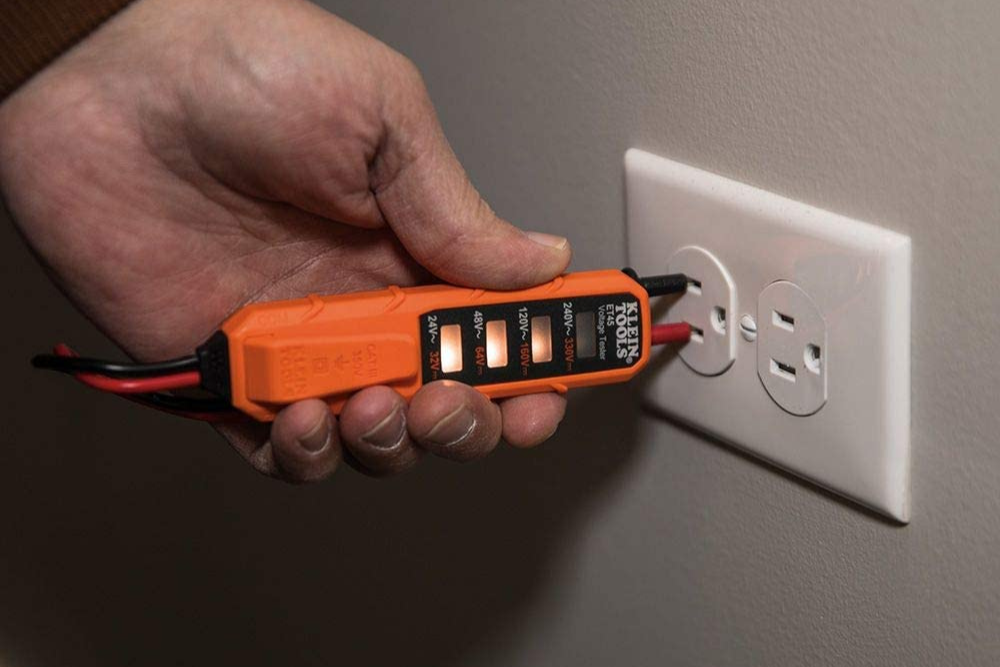
Whether the goal is to verify that power is turned off before starting an electrical project or to test the continuity of circuits to identify shorts in the system, this digital multimeter kit is an excellent option. It comes with a non-contact voltage tester, a receptacle tester, and a flashlight to help illuminate dim work areas. The kit includes batteries and a carrying case for storage and transportation.
Get the Klein Tools Digital Multimeter on Amazon for $52.49
7. Dismantling Knife
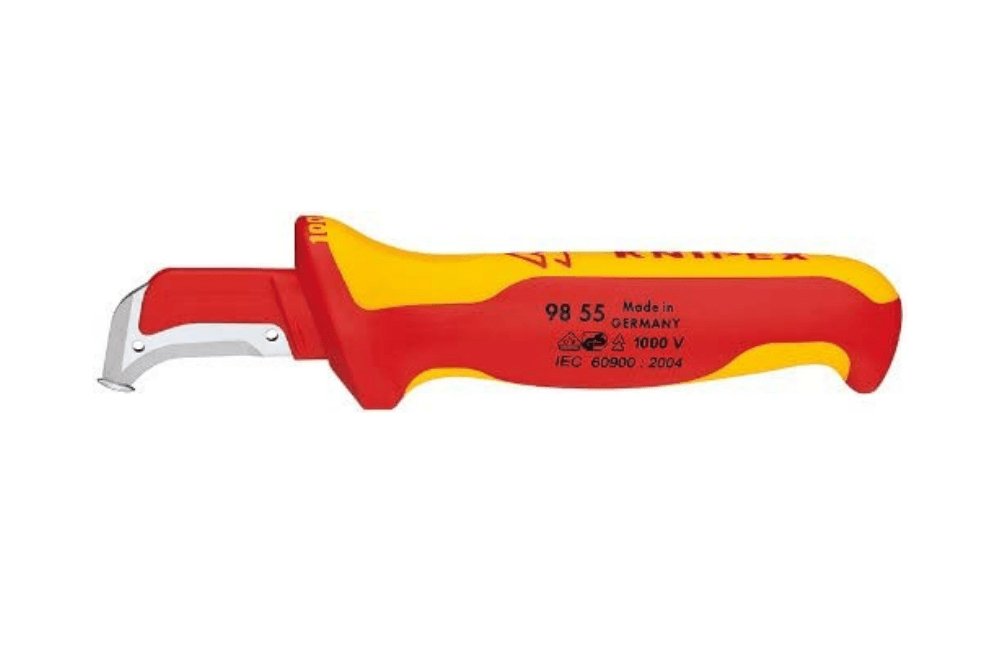
Cut through wire and conduit with the sharp precision-grade blade of this KNIPEX Tools dismantling knife. The tang of the blade extends into the handle, so users can rely on the strength and durability of this knife while they are slicing through hard materials. It’s made with an insulated handle that can protect the user from up to 1,000 volts.
Get the KNIPEX Tools Dismantling Knife on Amazon for $46.55
8. Crimper Pliers Set
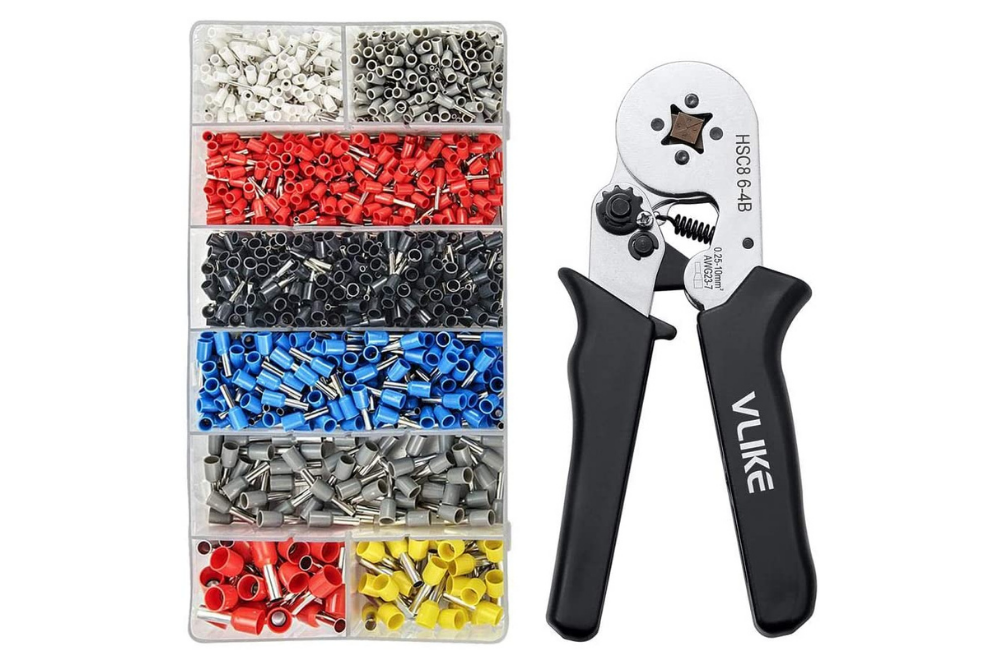
This ratchet-style crimping tool is a fast, effective way to crimp numerous connections, and it comes with 1,200 insulated wiring terminal sleeves so that users can make short work of wiring projects. The crimpers or crimping pliers have a nonslip nylon grip to improve control and maneuverability, as well as a contoured handle to fit the natural shape of the user’s hand. Adjust the ratchet to increase or decrease the crimping strength for precision control.
Get the VLIKE Ferrule Crimper Pliers Set on Amazon for $27.99
9. Fish Tape
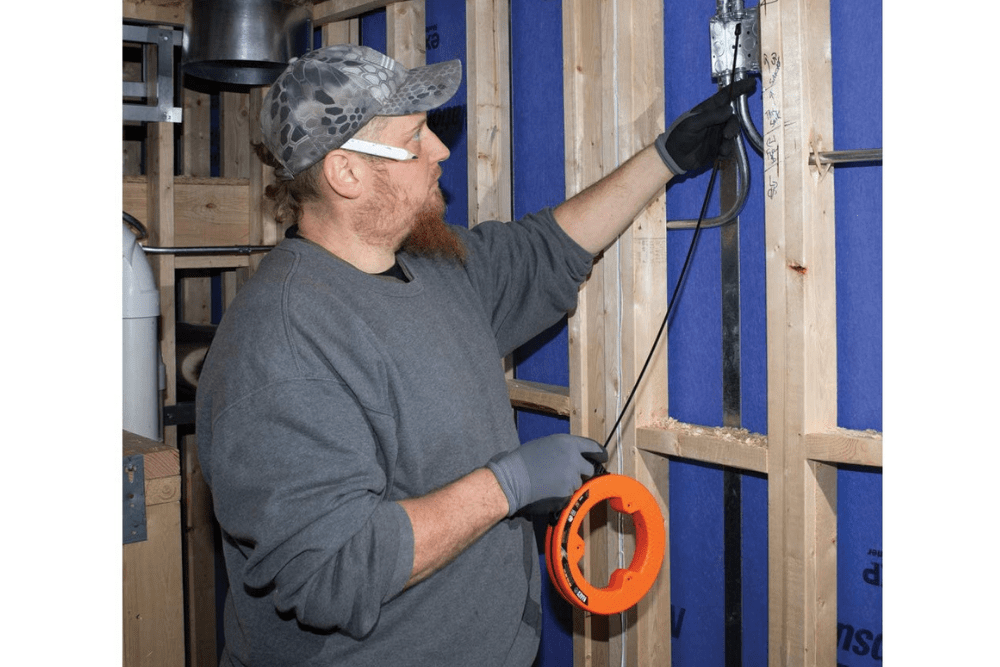
Experienced electricians who have been in the business for years make running wire look easy, but without the right tools it can feel impossible to pull a wire through an insulated wall or run it through a ceiling. This Klein Tools fish tape pulls out to 25 feet in length and has a slim plastic tip that helps navigate through tight spaces and reduce catching. The fish tape is also labeled with laser-etched markings in 1-foot increments to help keep track of the wire run length.
Get the Klein Tools Fish Tape on Amazon for $13.97
10. Insulated Needle-Nose Pliers

The long, narrow reach of these needle-nose pliers is ideal for working in tight locations, like in the ceiling or in the gap between drywall and an exterior wall. They have anti-slip, insulated handles that both improve user control and protect the user from up to 1,000 volts of alternating current. The pliers are made with chrome vanadium steel and feature an anti-rust coating to extend the life of the tool.
Get the SATA VDE Insulated Needle-Nose Pliers on Amazon for $15.55
11. Mini Hacksaw
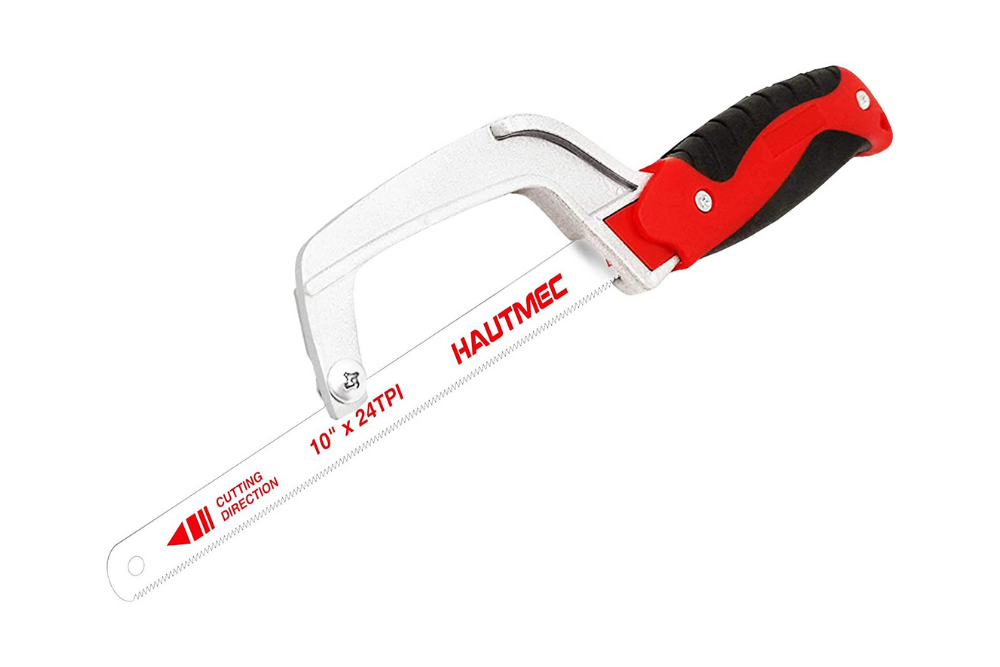
Conduit is commonly used by electricians in industrial, institutional, and commercial settings to create neat, protected wire runs. This mini hacksaw is excellent for cutting through pieces of conduit to make quick adjustments to the length during a long wire run. It has a lightweight aluminum frame and a textured, anti-slip grip to improve user control and maneuverability in smaller spaces.
Get the HAUTMEC Mini Hacksaw on Amazon for $10.99
12. Electrical Insulated Rubber Gloves
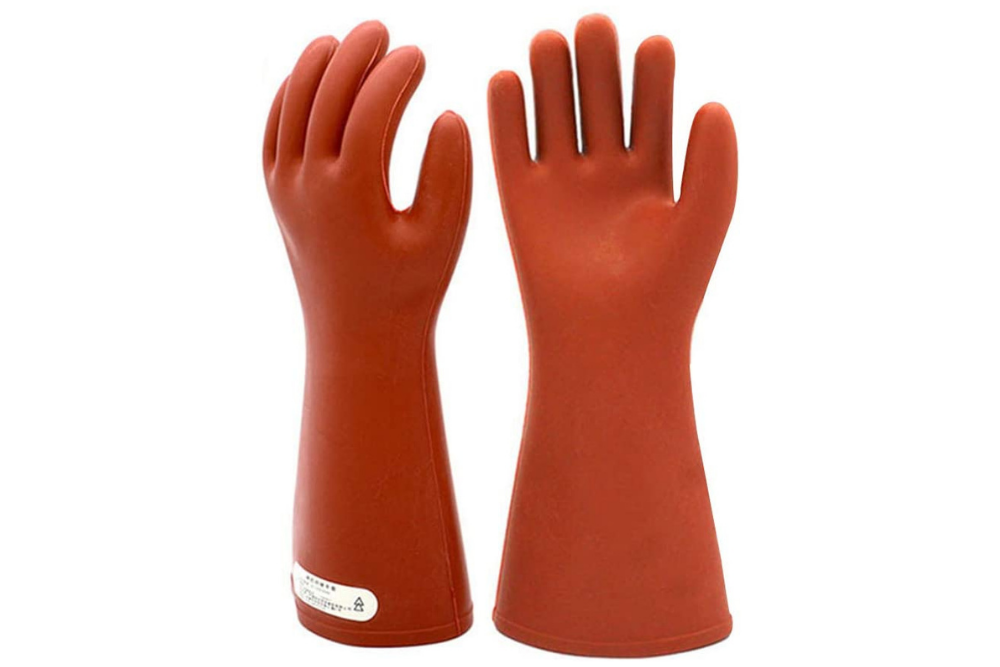
Safety is a big concern, so it’s a good idea to slip on a pair of insulated gloves before trying to work on an electrical system. These extend well beyond the wrists to protect the user’s hands and forearms from up to 12,000 volts. The contoured shape of the glove—which mimics the natural shape of the hand—reduces user fatigue and chafing from regular periods of use.
Get the ShuangAn Electrical Insulated Rubber Gloves on Amazon for $24.99
13. Impact Driver Kit
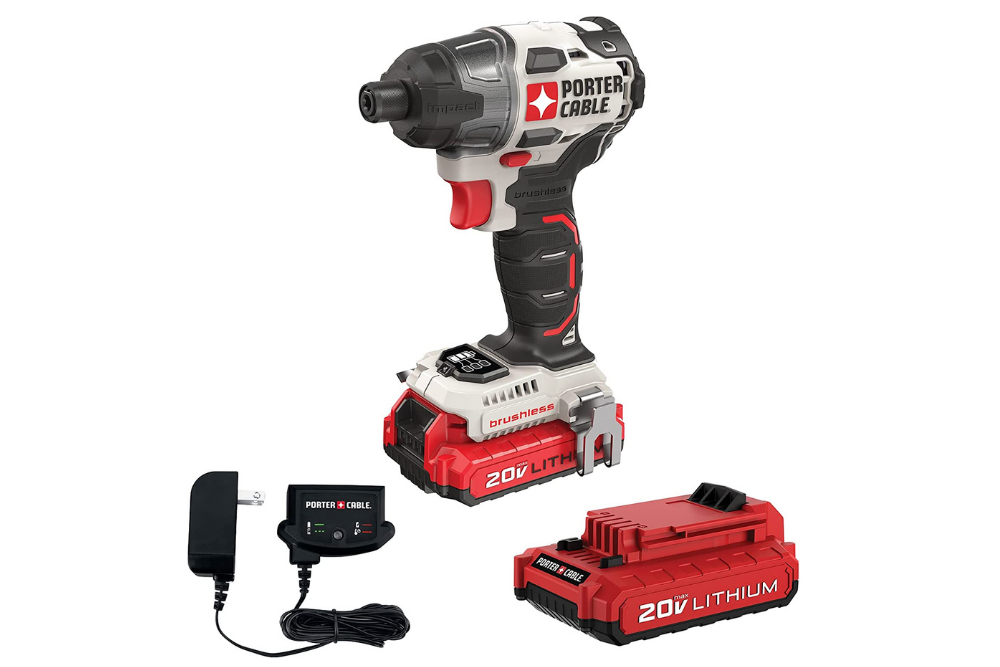
This lightweight impact driver can clip to the user’s tool belt or slide into the bottom of a tool box for easy storage and transportation. It operates at up to 2,700 RPM to rapidly fasten screws and is capable of producing up to 1,400 in-lbs of torque. The impact driver kit includes the impact driver, a 20V battery, and a battery charger. Just make sure to pay attention to the built-in battery charge indicator to avoid getting stuck in the middle of a job with a dead battery.
Get the PORTER-CABLE Impact Driver Kit on Amazon for $99
How We Chose the Best Electrician Tools
One of the most important aspects of the selection process was finding a variety of essential electrician tools that were designed with quality in mind. Extensive research into over 15 types of tools, including more than 30 individual options, helped determine the best electrician tools. It was necessary to look into electrician hand tools as well as the tools that are essential for a complete electrician tools set.
The options considered for the best electrician tools included several specialty tools, like wire strippers, crimpers, digital multimeters, voltage testers, electrical tape, fish tape, and conduit binders. However, it was important to keep in mind that, while specialty tools are attractive options for a list of the best electrician tools, most electrical jobs are completed with electrician hand or power tools. This meant that the overall value of the tool could not be based solely on the intended purpose.
FAQs
There is a lot to learn about electrician tools. For more information on electrician tools and equipment, check out the frequently asked questions below.
Q. Why are electrician tools important for electrical work?
There are many reasons electrician tools are important for electrical work, like providing insulation from electrical circuits and heat, as well as making the job easier to complete.
Q. How many tools does an electrician need?
Every electrician has their own preference when it comes to tools, so it’s difficult to state the exact number of tools electricians need. Instead, it’s better to consider the various tasks and projects an electrician takes on and make sure to have the appropriate tools for the job. Having the right tools is always better than having a lot of tools, especially when it comes to electrical work.
Q. What is the difference between electrical tools and electrical equipment?
There is a distinct difference between electrical tools and electrical equipment. Electrical tools are tools designed to work on electrical systems and on electrical equipment, while electrical equipment is any device powered by electricity.
Q. What tools does a first-year electrician need?
The best electrician tools for a first-year electrician include a digital multimeter, a voltage tester, a circuit finder, a utility knife, a screwdriver set, diagonal cutting pliers, side cutting pliers, needle-nose pliers, wire strippers, and fish tape.

